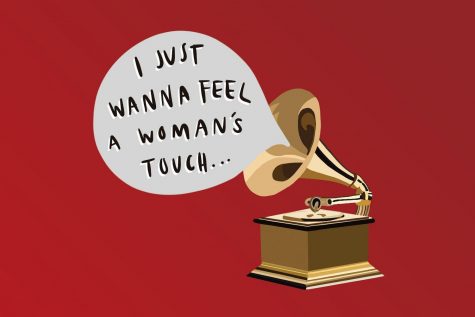OPINION | The music industry does not recognize the achievements of women
March 31, 2021

Since the beginning of the Grammy Awards in 1959, women have been continuously underrepresented in nominations and awards, and this trend continues today. In a study done by Northwestern University in 2018, it was found that on average, female artists have fewer collaborations and are consistently on the “periphery of the collaboration network.” This highlights the systematic and structural barriers that females face in an attempt to gain more visibility and advance their music careers. Unfortunately, this study comes as no surprise, because in reality, women have been undermined and discriminated against in “showbiz” since its creation in early Hollywood. In 2018, there was a trending hashtag, #GrammySoMale, after Alessia Cara was the only woman in the televised award show to be presented with an award. Other women took home awards during the untelevised section of the awards that happened earlier in the night including Lisa Leob, Reba McEntire, Aimee Mann and Carrie Fisher, but why were those notable and worthy women not televised?
This trend of the Recording Academy did not go unnoticed, as many male winners made comments on the consistent sidelining of women in the award show. Even the President of the Recording Academy made a comment in regards to the undermining of women within the industry. Unfortunately, his comment was less than encouraging, as it urged female artists to “step up” in order to earn as many awards as men.
The fact is that the music industry, while it is beautifully evolving today, has been for many years a men’s club. Some of the main issues that lay embedded in the music industry can be directly traced back to centuries-old standards for society. In the early eras like the Renaissance, Baroque, Classical and Romantic periods, there is hardly a trace of women in music. In years after, there were women who went against the grain and celebrated their talents despite the fraction of attention that their male counterparts garnered.
Fast forward to the 1980s. Women were given a larger platform within the music industry. This goes to say, music that was created by women and performed by women was given more attention and praise. Their visibility did not occur, however, without the scrutiny and judgement on qualities that were at times completely removed from the content that they produced. A study produced by the University of Southern California in 2019 interviewed 75 female songwriters and producers. Of these 75, more than 40% said that their talent was overlooked or dismissed by their male colleagues, and 39% stated that stereotyping and sexualization were obvious blockades to their careers. Additionally, women struggled getting their deserved place at the table because they were often equated to “groupies,” and if there was nothing they could physically offer the men in the business, then there was no place for them. Icons like Madonna used this to her advantage, as she used the sexualized view of women on the stage to be a symbol for sexual liberation for many. This, on one hand, opened the door for women to use sexuality as a form of empowerment as performers in the music industry but then also set the precedent for women in the music industry to not be deemed desirable enough if their “image” wasn’t sexy enough.
Today, we have women presenting in whatever ways they feel comfortable, which is powerful in itself and should be celebrated. While there is still a large margin between award-winning women and men, women in the music industry today show that it will be their talent, content and chosen cultivated aesthetic that get celebrated rather than their looks.
What is most troubling is that it has taken time for even all women to stand together under one goal: to be a united front against their discrimination within the music industry. Female music artists such as Lil Kim and Azealia Banks have been open about their transphobic feelings in the past. In order for mutual uplifting on women in and out of the music industry, we must vow to support, love and respect one another.
Numerous women stand out as pioneers of their chosen genre, but this does not go without saying there is so much more work to be done. How will the Recording Academy specifically rectify its biased way of navigation in order to create an elevated and celebrated space for women on the stage? How will we, as consumers, support the female artists that fill our favorite playlists and create our most beloved soundtracks so that they get the visibility and recognition they deserve? As Women’s History Month comes to a close, let this be the urge to support and invest in women in music, as they get enough strife within their own community.









Teresa Moore • Apr 14, 2021 at 12:52 am
Thanks for sharing this nice post. I like your post.